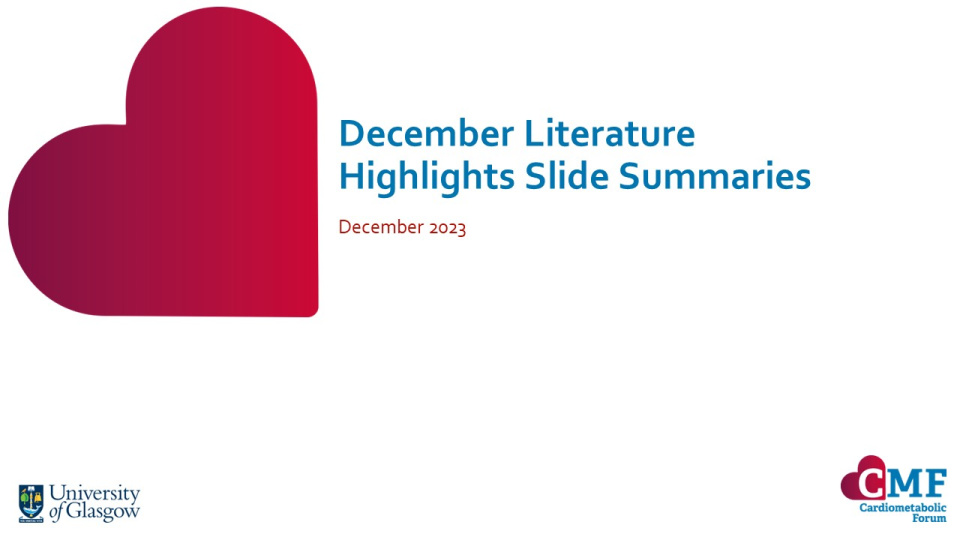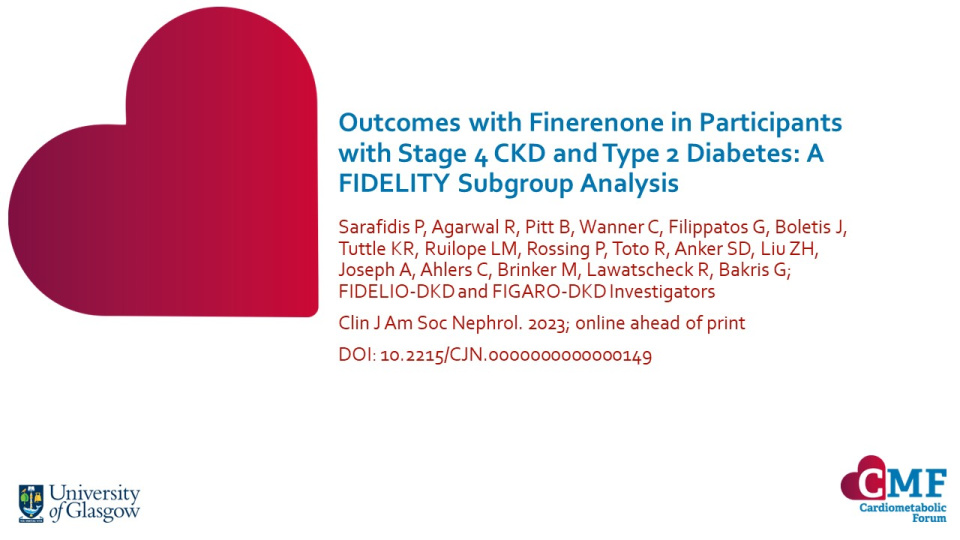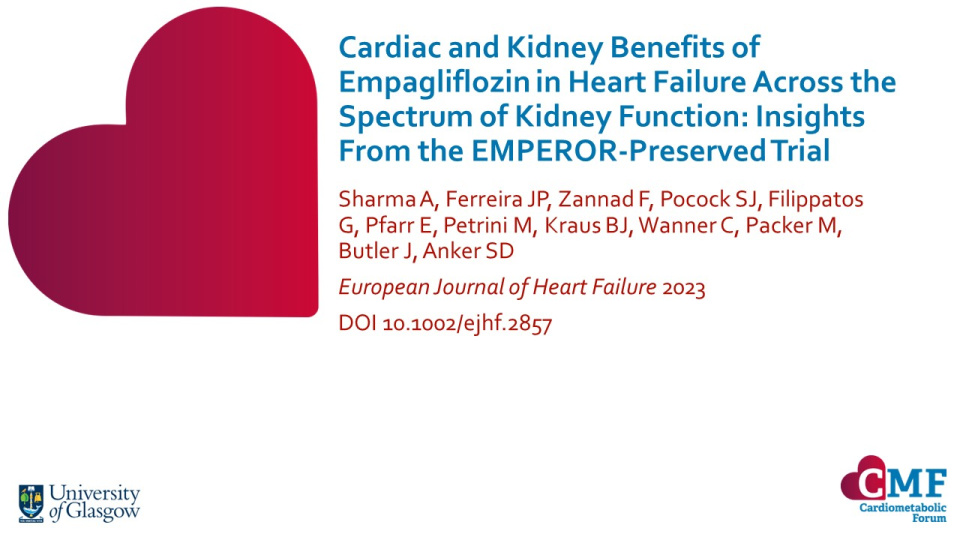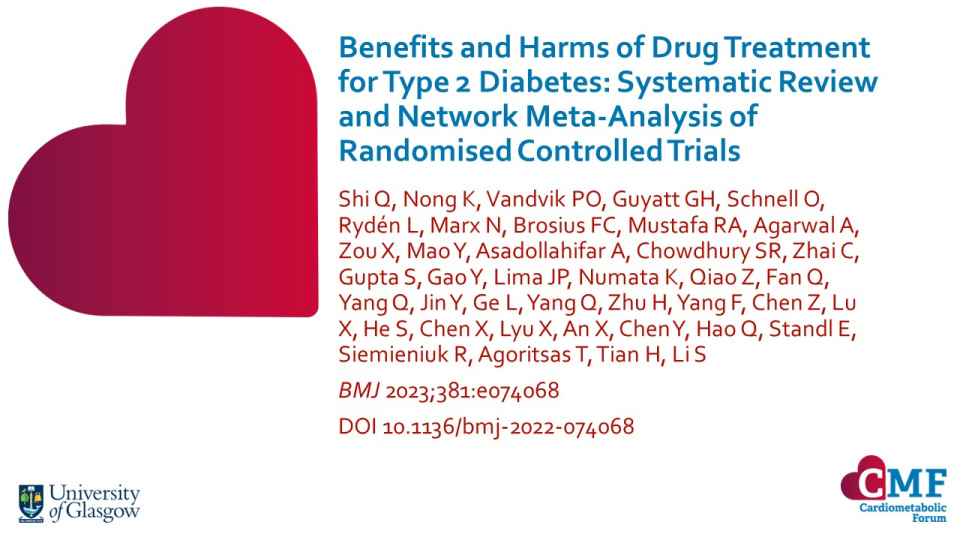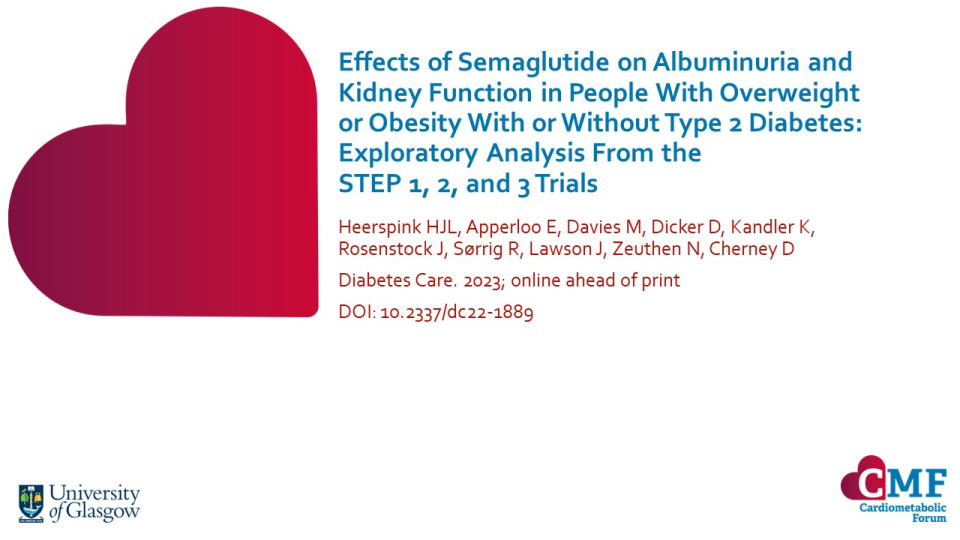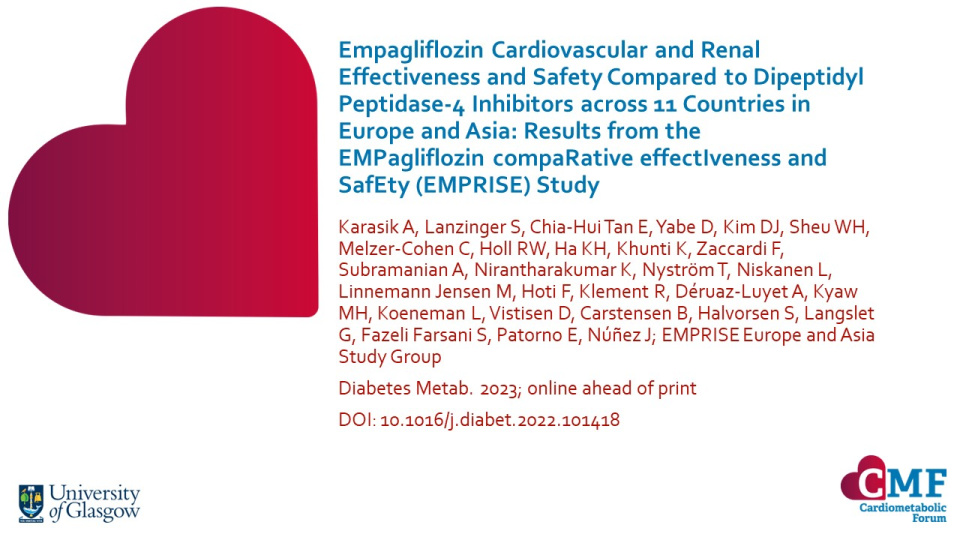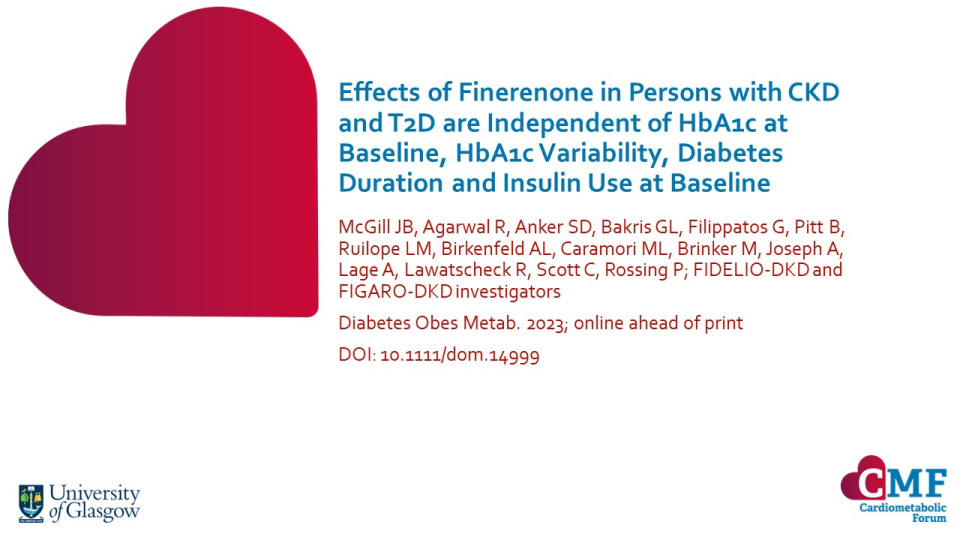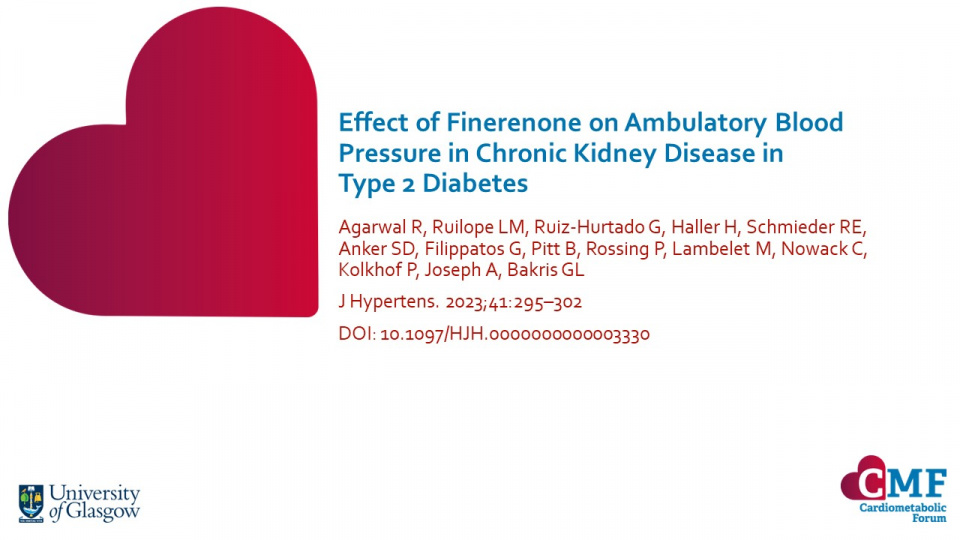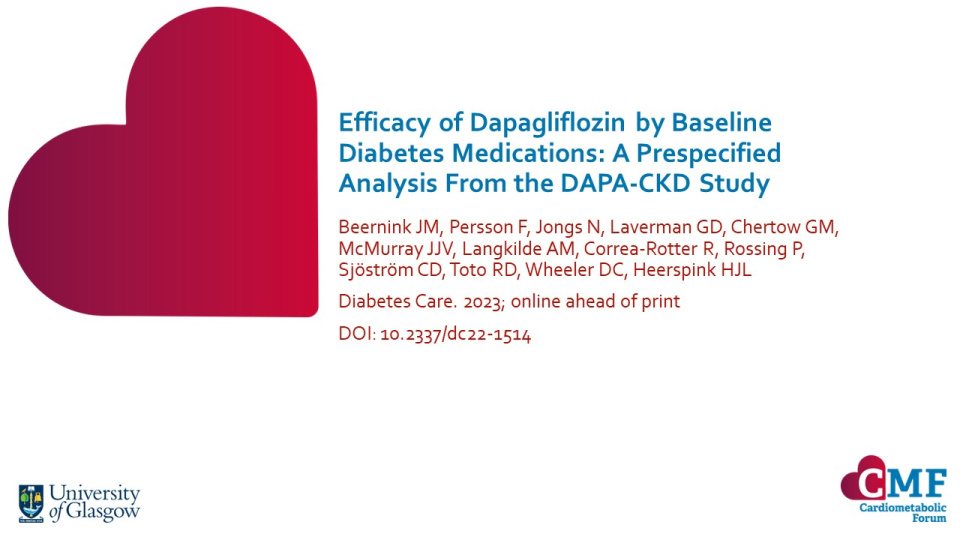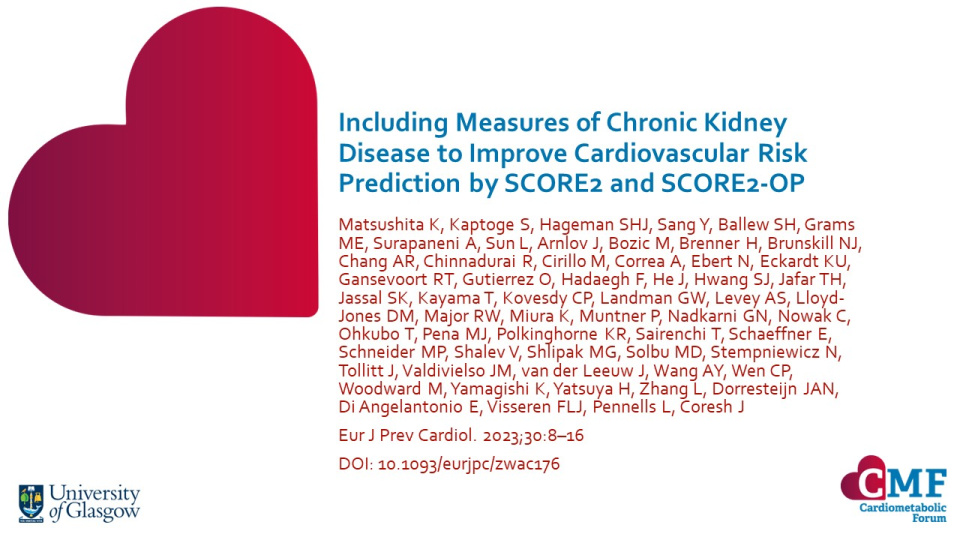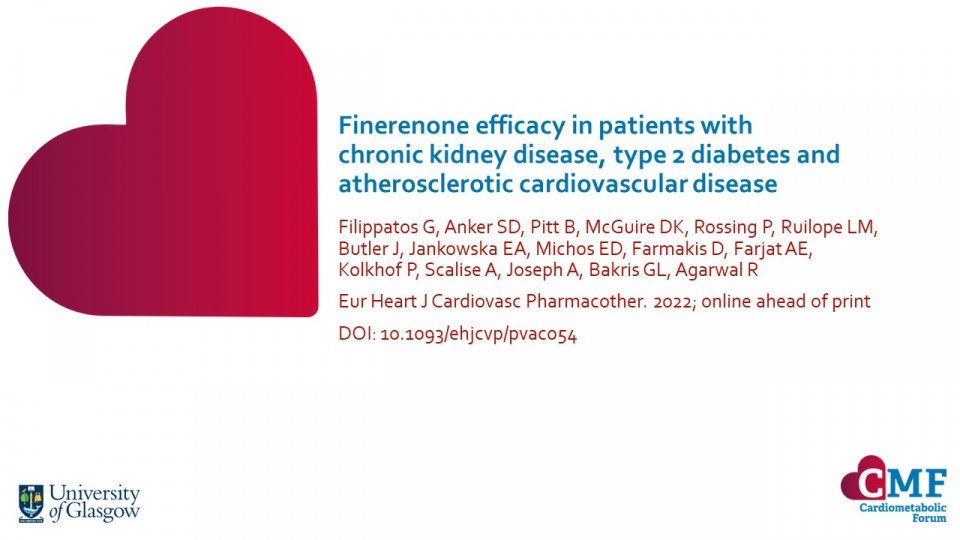Publications
Stay up to date with our literature reviews which are curated by experts to feature the most important publications released each month. Explore our publications for access to concise summary slides for your own use.
Outcomes with Finerenone in Participants with Stage 4 CKD and Type 2 Diabetes: A FIDELITY Subgroup Analysis
Clin J Am Soc Nephrol. 2023; online ahead of print DOI: 10.2215/CJN.0000000000000149
Patients with stage 4 CKD and T2D have limited treatment options to reduce their persistent CV and kidney risk. This post hoc analysis of the FIDELITY database evaluated the effect of finerenone vs placebo in 890 patients with stage 4 CKD and T2D.
Keywords:
Cardiac and Kidney Benefits of Empagliflozin in Heart Failure Across the Spectrum of Kidney Function: Insights From the EMPEROR-Preserved Trial
European Journal of Heart Failure 2023 DOI 10.1002/ejhf.2857
In the EMPEROR-Preserved trial, empagliflozin was found to improve the clinical outcomes of patients with heart failure and preserved ejection fraction (HFpEF). This pre-specified analysis sought to explore the effect of empagliflozin on cardiovascular (CV) and kidney outcomes across different levels of kidney function.
Benefits and Harms of Drug Treatment for Type 2 Diabetes: Systematic Review and Network Meta-Analysis of Randomised Controlled Trials
BMJ 2023;381:e074068 DOI 10.1136/bmj-2022-074068
Keeping abreast of the rising volume of randomized trials in adults with type 2 diabetes presents a formidable task. Recent randomized trials have shown cardiovascular and kidney advantages with finerenone, an innovative non-steroidal mineralocorticoid receptor antagonist, and weight loss with tirzepatide, a dual glucose-dependent insulinotropic polypeptide/glucagon-like peptide-1 (GLP-1) receptor agonist.
Keywords:
Effects of Semaglutide on Albuminuria and Kidney Function in People With Overweight or Obesity With or Without Type 2 Diabetes: Exploratory Analysis From the STEP 1, 2, and 3 Trials
Diabetes Care. 2023; online ahead of print DOI: 10.2337/dc22-1889
In the STEP trials, semaglutide markedly reduced body weight and improved glycaemic control in adults with overweight or obesity with/without T2D. However, the effects of semaglutide on albuminuria and eGFR are unknown.
Empagliflozin Cardiovascular and Renal Effectiveness and Safety Compared to Dipeptidyl Peptidase-4 Inhibitors across 11 Countries in Europe and Asia: Results from the EMPagliflozin compaRative effectIveness and SafEty (EMPRISE) Study
Diabetes Metab. 2023; online ahead of print
Previously, the real-world EMPRISE US study found that empagliflozin initiation was associated with a lower risk of hospitalisation for HF, all-cause mortality and CV events when compared with DPP-4i.
Keywords:
Effects of Finerenone in Persons with CKD and T2D are Independent of HbA1c at Baseline, HbA1c Variability, Diabetes Duration and Insulin Use at Baseline
Diabetes Obes Metab. 2023; online ahead of print DOI: 10.1111/dom.14999
Given the role of HbA1c, diabetes duration and insulin use in determining morbidity and mortality of CKD in T2D, it is important to investigate whether these factors modify the efficacy and safety of therapies that mitigate the cardiorenal impact of CKD in T2D. This post hoc analysis of the FIDELITY database evaluated the effect of finerenone by baseline HbA1c, HbA1c variability, diabetes duration and baseline insulin use on cardiorenal outcomes and diabetes progression.
Keywords:
Effect of Finerenone on Ambulatory Blood Pressure in Chronic Kidney Disease in Type 2 Diabetes
J Hypertens. 2023;41:295–302 DOI: 10.1097/HJH.0000000000003330
It has been postulated that the effects of finerenone on cardiorenal outcomes may be mediated primarily via non-haemodynamic pathways, but office BP measurements are insufficient to fully assess haemodynamic effects. A substudy of the ARTS-DN phase IIb trial was conducted to obtain further insights into the mechanism of action of finerenone by analysing 24-h ambulatory BP in patients with CKD and T2D.
Keywords:
Efficacy of Dapagliflozin by Baseline Diabetes Medications: A Prespecified Analysis From the DAPA-CKD Study
Diabetes Care. 2023; online ahead of print DOI: 10.2337/dc22-1514
Achieving optimal glucose control can be challenging in patients with T2D and CKD because impaired kidney function hampers the use of several oral or injectable glucose-lowering therapies (GLTs) and increases the likelihood of hypoglycaemia. This prespecified analysis from the DAPA-CKD trial evaluated whether the benefits of dapagliflozin in patients with T2D and CKD varied by background GLT number or class.
Keywords:
Including Measures of Chronic Kidney Disease to Improve Cardiovascular Risk Prediction by SCORE2 and SCORE2-OP
Eur J Prev Cardiol. 2023;30:8–16 DOI: 10.1093/eurjpc/zwac176
The 2021 ESC guideline on CVD prevention categorises moderate and severe CKD as high and very-high CVD risk status regardless of other factors like age and does not include eGFR and albuminuria in its SCORE2 and SCORE2-OP algorithms to predict CVD risk. Here, three CKD ‘Add-ons' to SCORE2 and SCORE2-OP were developed and validated: eGFR only, eGFR + urinary albumin-to-creatinine ratio (the primary Add-on), and eGFR + dipstick proteinuria.
Keywords:
Cost-Effectiveness of Dapagliflozin as a Treatment for Chronic Kidney Disease: A Health-Economic Analysis of DAPA-CKD
Clin J Am Soc Nephrol. 2022; online ahead of print DOI: 10.2215/CJN.03790322
Dapagliflozin has been shown to reduce CKD progression and KRT requirement when added to standard therapy in patients with CKD in the DAPA-CKD trial. This analysis was designed to estimate the cost-effectiveness of dapagliflozin for the treatment of CKD from payer perspectives in the UK, Germany and Spain.

